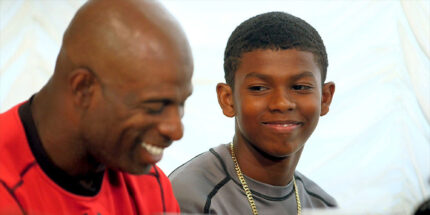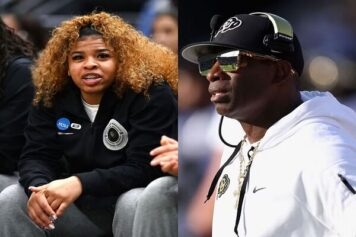Vero Beach, FLA. — A who’s who of African-American former major leaguers descended upon Historic Dodgertown for The Hank Aaron Invitational, a jewel of baseball’s many diversity initiative programs.
Major League Baseball, the Major League Baseball Players Association (MLBPA), USA Baseball and the Atlanta Braves have partnered up to work together on the two-week camp. This year an added element to the baseball crash course enables 44 players from the older age group to meet Hammerin’ Hank Aaron and play a game at Sun Trust Park in Atlanta on Saturday.
The Hank Aaron Invitational features 125 Players from 19 U.S. States.
Players (ages 13-18) receive elite-level training from former Major League players and coaches. Week One was a huge success and is for players ages 13-14. Week Two, for players 15-17, is winding down and the entire event was filled with baseball knowledge as kids received first-hand instruction and education from prominent figures such as MLB Commissioner Rob Manfred and Hall of Fame players Ken Griffey Jr. and Andre “Hawk” Dawson.
With the dearth of black pitchers in MLB, some of the most important coaches at the camp are former African-American hurlers Tom “Flash” Gordon, Marvin Freeman and Patrick Mahomes Sr, father of NFL MVP and Super Bowl Champion Pat Mahomes. Combined they possess almost 50 years of pro-level pitching experience.
In 2018, Milwaukee’s Jeremy Jeffress was the only African-American pitcher on the All-Star roster. In 2019, it was NY Mets pitcher Marcus Stroman.
I spoke with each former pro about MLB’s recent Hall of Fame inductions, why they are so heavily involved in MLB’s diversity and inclusion programs and the state of the Black pitcher.
Pat Mahomes Sr. was an MLB journeyman from 1992 to 2003, playing for several squads, including the Boston Red Sox, New York Mets, Texas Rangers, Chicago Cubs, and Pittsburgh Pirates. He also pitched in Japan for two seasons in Nippon Professional Baseball in 1997 and 1998 for the Yokohama BayStars.
The Shadow League: What makes you want to come out every year and share your years of experience with these kids? What do you think of the program?
Patrick Mahomes Sr: The program is moving in the right direction. I have a passion for spreading the knowledge that I’ve learned over the years. I learned how to pitch when I got to the Big Leagues. I didn’t have anybody to show me the way and mentor me and tell me what was needed and I wish I did.
Now that I have a chance to go and provide the youth with some of the things I didn’t have, maybe they can be successful with it wherever they go — college, high school wherever. I just think it makes it that much easier for them.
Events like the Hank Aaron Invitational offer a safe haven to just focus on the game. https://t.co/nNyci4na3A 🙏 pic.twitter.com/iyKjgsUyZ1
— MLBDevelops (@MLBDevelops) August 1, 2019
TSL: What’s the future for the Black pitcher?
Mahomes Sr: We were talking about it last night. CC Sabathia will probably be the last Black pitcher to go into the Hall of fame, but hopefully with programs like this, and the guys we are mentoring will be on the come up, and we will start having a passion for pitching again and get some guys in the majors to do some things.
Tom “Flash” Gordon is one of the most effective closers in MLB history. From 1988-2009, he pitched for the Kansas City Royals, Boston Red Sox, Chicago Cubs, Houston Astros, Chi-Town White Sox, Yankees and Phillies, and the Arizona Diamondbacks.
Known for his blazing heat and wicked curveball, in 1998-99 Flash set a then-MLB record with 54 consecutive saves.
The Shadow League: Why is a program like the Hank Aaron Invitational so important?
Tom “Flash “ Gordon: The most important thing you have …if you look around you see the love these kids have for the game as well and they all look like me. That’s what’s important. It’s essential for them to not only play to develop but also have good grades and be good character kids in general and baseball brings about that.
So this is a privilege to be selected to be a part of something special. It’s also involved in the history of what Hank Aaron was about and the young guys who get a chance to come here. Not only do they just get to be together and know that all over the world there are kids who look like them, run like them, have the ability they have and can do some of the things that they do, but now these kids get to come together and have an opportunity to talk and there’s now an alumni…Something that brings out the goodness about playing the game right and there’s a face we can put to it.
.@MLB_PLAYERS Executive Director Tony Clark meets with players at the Hank Aaron Invitational. pic.twitter.com/EmPxvlKuin
— MLBDevelops (@MLBDevelops) August 1, 2019
TSL: Black Knight Harold Baines was recently inducted into the MLB Hall of Fame by the Veteran’s committee? Talk about your experiences with one of baseball’s true gentlemen.
Flash Gordon: Harold Banes is one of the great hitters of all-time, man. When you look at Harold you understand how profound and how great his swing was and also how deeply he understood the game. Also how professional he was. He gave information and helped the young players become better players.
He led by example. His energy was great. I got a chance to be around him in Chicago and there was no better man in the game.
TSL: People speak about Mariano Rivera in the same vein, no?
Flash Gordon: Indeed. Mariano Rivera is one of the greatest people I’ve ever met. Sometimes we are told that good guys finish last, but not in Rivera’s case. So how’d he do it? Not only was his faith in God superior, but the man himself was a guy that took care of baseball. He was a pro in every sense of the word.
I had the luxury of playing with Mariano in 2004-05 with the Yankees and I never saw anybody work harder or be more prepared. I got a chance to become his setup guy and I learned more in that brief stint with him than I learned in the last seven or eight years from watching how he went about it. Here I was 14 or 15 years into the Big Leagues and I’m learning from a guy that’s 4-5 years younger than me.
Pitcher Marvin Freeman played for the Philadelphia Phillies, Atlanta Braves, and Colorado Rockies from 1986 to 1996. He was the No. 2 pick out of Jackson State University by the Phillies in 1984 and worked as both a starter and reliever in his career, compiling a winning 35-28 record.
Freeman now dedicates his time to developing pitchers of color in his hometown of Chicago and at MLB’s Hank Aaron Invitational where more than 30 participants have been drafted since 2015 when it was EDI.
The Shadow League: Why do you lend endless hours of your summertime to coaching at the Hank Aaron Invitational?
Freeman: When I was growing up I used to say man I wish somebody can give me some information that I can use at an early age. Even though I made it to the Big Leagues, I learned most of that stuff after I had been in MLB for three of four years. I really didn’t learn how to pitch until I was 28 years old. If I had some understanding and knowledge at 14. Who knows how much better I could have been?
So if I have the opportunity to share my experience with a kid who is 13 or 14 down here. I give em a tidbit and something they can work and grow on and when they get old enough to realize what that meant to them. They will then go and help somebody else.
TSL: What was your relationship with 2019 Hall of Fame inductee Harold Baines?
Freeman: I played with him for one year with the White Sox. Harold’s a great guy man. Put it down on the field for a long time and I have been hearing a lot of “why him ?” and “why not this guy?”…well everybody ain’t gonna get that chance.
Everybody ain’t going. He’s been on the ballot for a long time and got voted in by the Veterans Committee. Whos to say he doesn’t deserve that? Anybody who gets 3,000 hits (Harold had 2,866)… that used to be automatic.
The Shadow League: Vanderbilt’s Kumar Rocker made history when he served up a 16-K no-hitter in the CWS Super Regional. How come we don’t see more brothers on the mound getting it in?
As good as gold. ⭐️#VandyBoys | #AnchorDown pic.twitter.com/fkUAhdGb0a
— Vanderbilt Baseball (@VandyBoys) January 29, 2020
Freeman: It looks like to me that (MLB) is trying to make guys careers shorter. With all of this… you gotta throw 95 to even get a look from a scout. The art of pitching is no longer a priority. It’s just throwing and whoever throws the hardest is going to be the guy to get the opportunity.
TSL: There’s a flip side to that.
Freeman: …you see how these guys are throwing 100 mph and getting hurt? Look at all these young black pitchers that came up like Hunter Greene and St. Louis closer Jordan Hicks, who both threw out their arms as soon as they turned pro. That’s inevitable if your priority is to max effort on every throw. Your career is going to be short and there’s no way you are going to accumulate enough numbers to even be considered as a Hall of Famer.
(It seems as if the position is lending itself less and less to the African-American player’s skill set.)
Now you even have relievers starting games..they got something called an ‘opener’ now. So just the way the dynamics of the game is changing, who knows how it’s going to go.
Straight knowledge from some well-credentialed Black Knights.



